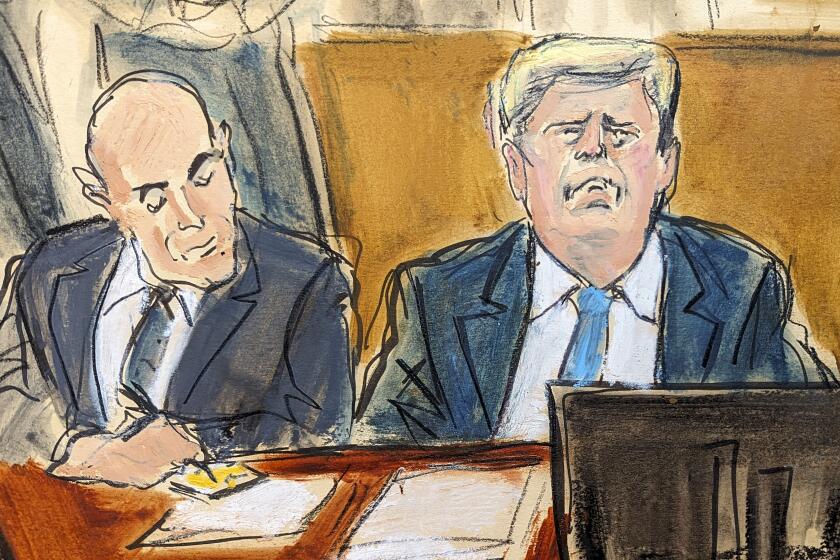Gorbachev Denies He’ll Quit as Leader of Party
Soviet President Mikhail S. Gorbachev said Wednesday that he does not intend to resign as Communist Party chief, but the nation’s media reflected a spirited debate over the future Soviet power structure before an important meeting of the party leadership early next week.
Responding to a question about a resignation rumor that sent tremors through world capitals Tuesday, Gorbachev declared: “I have no intention of doing so (resigning his party post). No one has said this, and I certainly didn’t make any such statement. Any such suggestions are groundless.”
Cable News Network reported Tuesday that Gorbachev was considering giving up his party post while trying to retain political control through his second office as president and head of the nation’s Parliament.
Buttressing Gorbachev’s denial, which was made at a photo session with Brazilian President-elect Fernando Collor de Mello, Foreign Ministry spokesman Gennady I. Gerasimov said at a subsequent news conference: “It’s better for perestroika when Gorbachev combines these two posts, because as President he can influence the party, and as a party member he can influence the Parliament.” Perestroika is the term used to identify Gorbachev’s program of political and economic reform.
Gerasimov also denied that a recent flurry of Western speculation about Gorbachev’s political prospects had weakened the Soviet leader. However, the spokesman added, “Maybe (Gorbachev) is a little bit annoyed” by the rumors.
After Wednesday’s denials, Western diplomats here speculated that the resignation rumors may have grown out of a genuine discussion under way in senior political circles about possible changes in the balance of power between the Communist Party apparatus and the government.
Traditionally, Soviet leaders have reigned primarily through their leadership of the Communist Party, which still claims the “leading role” in society. But elsewhere in what used to be the Soviet Bloc, the old system has already given way. In Poland, for example, Wojciech Jaruzelski gave up his post as party leader last year and now exercises his power through an enhanced presidency.
Debate over the possibility of a similar change here is occurring at a time when Gorbachev’s program is under mounting threat from a stagnant economy and separatist threats from rebellious republics in the far-flung Soviet empire. Those threats, as well as discussion of the future role and structure of the party, are on the agenda of next week’s plenary meeting of the 250-member Communist Party Central Committee.
The plenum, which sets policy between full-blown party congresses, has the power to install or remove members of the ruling Politburo, which Gorbachev chairs.
The lead-up to such a crucial meeting is typically filled with speculation about leadership changes. Combined with the genuine debate about redefining the party’s role, it provides a natural breeding ground for the Gorbachev resignation rumors, the diplomats said.
“I find a theoretical discussion completely plausible,” one diplomat said Wednesday, adding: “I just don’t see anything happening by the plenum. But I could imagine it by the end of the year,” after other changes that would ensure no one else could use the party leadership to usurp Gorbachev’s authority.
Gerasimov stressed Wednesday that the question of separating the powers and posts of Communist Party chief and president “was discussed very thoroughly” nearly a year ago, at the first session of the country’s revitalized Parliament. A majority of deputies decided they wanted Gorbachev to hold both jobs, he said.
Indeed, the main question raised by a “debate in print” published Wednesday by the Communist Party newspaper, Pravda, was whether Gorbachev needs more power, not less.
The newspaper keyed the debate on its front page with an excerpt from an unidentified reader’s letter.
“Democratization often turns into anarchy,” it read. “The country and its economy are rocking under strikes and unprecedented disruptions in transportation and consumer supplies. Innocent blood is being spilled in some parts of the country. Did people hope for this when perestroika started?
“But the most discouraging aspect of all is the sight of the central organs of power displaying disheartening irresolution under crisis circumstances. Perhaps the chairman of the Presidium of the Supreme Soviet (Gorbachev) does not have enough powers? Then let’s raise this issue . . . and resolve it at once. There is no time to waste. Perestroika is in danger!”
Vladimir A. Zots, a member of the Central Committee staff, argued for “a clearly defined” presidency, freed of subservience to the party.
“Theoretically, it is possible that a plenum of the Central Committee revokes his mandate as a (parliamentary) deputy on the party list, and we shall suddenly lose our head of state,” Zots wrote. Currently, he warned, the Soviet president “has no legal protection whatsoever.”
More to Read
Start your day right
Sign up for Essential California for news, features and recommendations from the L.A. Times and beyond in your inbox six days a week.
You may occasionally receive promotional content from the Los Angeles Times.






